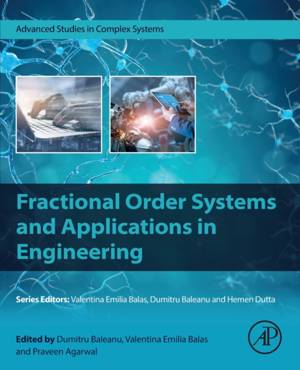
- Afhalen na 1 uur in een winkel met voorraad
- Gratis thuislevering in België vanaf € 30
- Ruim aanbod met 7 miljoen producten
- Afhalen na 1 uur in een winkel met voorraad
- Gratis thuislevering in België vanaf € 30
- Ruim aanbod met 7 miljoen producten
Zoeken
Fractional Order Systems and Applications in Engineering
€ 288,45
+ 576 punten
Omschrijving
Fractional Order Systems and Applications in Engineering presents the use of fractional calculus (calculus of non-integer order) in the description and modelling of systems and in a range of control design and practical applications. The book covers the fundamentals of fractional calculus together with some analytical and numerical techniques, and provides MATLAB(R) codes for the simulation of fractional-order control (FOC) systems. The use of fractional calculus can improve and generalize well-established control methods and strategies. Many different FOC schemes are presented for control and dynamic systems problems. These extend to the challenging control engineering design problems of robust and nonlinear control. Practical material relating to a wide variety of applications including, among others, mechatronics, civil engineering, irrigation and water management, and biological systems is also provided. All the control schemes and applications are presented with either system simulation results or real experimental results, or both. Fractional Order Systems and Applications in Engineering introduces readers to the essentials of FOC and imbues them with a basic understanding of FOC concepts and methods. With this knowledge readers can extend their use of FOC in other industrial system applications, thereby expanding their range of disciplines by exploiting this versatile new set of control techniques.
Specificaties
Betrokkenen
- Uitgeverij:
Inhoud
- Aantal bladzijden:
- 390
- Taal:
- Engels
- Reeks:
Eigenschappen
- Productcode (EAN):
- 9780323909532
- Verschijningsdatum:
- 21/11/2022
- Uitvoering:
- Paperback
- Formaat:
- Trade paperback (VS)
- Afmetingen:
- 190 mm x 235 mm
- Gewicht:
- 671 g

Alleen bij Standaard Boekhandel
+ 576 punten op je klantenkaart van Standaard Boekhandel
Beoordelingen
We publiceren alleen reviews die voldoen aan de voorwaarden voor reviews. Bekijk onze voorwaarden voor reviews.







